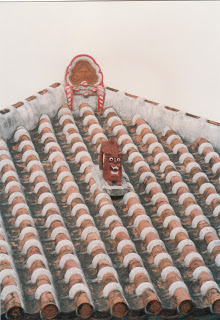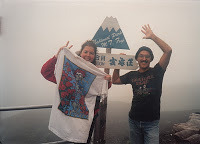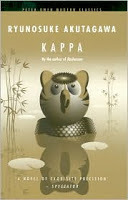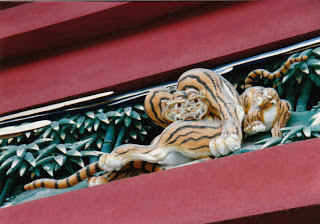Sara Backer's Blog, page 19
February 27, 2010
Eric Paul Shaffer on Plot and Star-Gazing
 Is there a plot in your novel?
Is there a plot in your novel?The metaphor for the use of plot in traditional fiction is a train ride: start at this station, move along the tracks, sidings, and stations, and end at the destination station. The metaphor for the use of plot in Burn & Learn is star-gazing: there are multiple lights of differing magnitudes that appear in various places in the visible sky, and they make patterns based on the images you can see there or draw there or create there by joining those points together....
Published on February 27, 2010 09:00
February 26, 2010
Eric Paul Shaffer Pushes Reality to Its Outer Limits

Let's talk more specifically about Burn & Learn. Are you serious when you claim on the title page of Burn & Learn that your novel is a "sequel" to H.G. Wells' The Time Machine?
Yes, I am. There are a number of internal character clues or cues that correspond with Wells' tale, of course, and I have essentially transported one aspect of one of Wells' main characters into one of mine. In my humble estimation, Burn & Learn is a "logical" end to Wells' novel. My text also answers a number of qu...
Published on February 26, 2010 09:00
February 24, 2010
Burn & Learn with American Fuji
 Eric, why would readers of American Fuji appreciate your novel Burn & Learn?
Eric, why would readers of American Fuji appreciate your novel Burn & Learn?You and I share a belief that readers are the most important people in the novel. What I mean is that we both do our best to be clear about the story we are telling, and we try to make our novels clear and accessible.
And accurate.
Each of us uses our strengths. You are a plotter, and your plots are surprising and logical and satisfying to me. Plotting is not my strength, so I made a strength of focusing on the even...
Published on February 24, 2010 09:00
February 22, 2010
Eric Paul Shaffer on Climbing Fuji
 My blog followers know you and your wife Veronica climbed Mt. Fuji with me. How does that compare to other mountains you've climbed?
My blog followers know you and your wife Veronica climbed Mt. Fuji with me. How does that compare to other mountains you've climbed?Mt. Fuji, for which I maintain a great affection, is a fairly simple "walk-up." The way to the peak is fundamentally an inclined path. Some of the climbers on the trail with us were sprightly folks of over sixty or seventy, and they were doing fine. My experience on Mt. Fuji was mainly one of irony. We left in the dark to climb through the night in order to...
Published on February 22, 2010 09:00
February 20, 2010
Eric Paul Shaffer Reverses the Question
 So, Eric, you lived in Okinawa the same years I lived in Shizuoka City, the setting for American Fuji. What did you find in American Fuji that corresponded with your life on the island?
So, Eric, you lived in Okinawa the same years I lived in Shizuoka City, the setting for American Fuji. What did you find in American Fuji that corresponded with your life on the island?The difficulties that Gaby and Alex, as gaijin, have in acquiring solid information were familiar to me. Many times I wondered why I was unable to get answers to what seemed to be basic and simple questions, such as how I should acquire a parking space at my apartment complex. I am very glad I didn't have to...
Published on February 20, 2010 09:00
February 18, 2010
Eric Paul Shaffer's Favorite Japanese Novelists
 Which Japanese novelists would you recommend to our readers?
Which Japanese novelists would you recommend to our readers?Dazai (especially The Setting Sun and No Longer Human, both of which acknowledge a side of Japanese culture I glimpsed but that is often unacknowledged and for his stark lyricality) Öe (for the same reasons), Sōseki (for his crazy inventiveness, humor, and honest portrayal of Japanese culture), and Akutagawa (for Kappa, a charming novel). Oddly, I find the work of H. Murakami, the popular contemporary Japanese author, interesting bu...
Published on February 18, 2010 09:00
February 17, 2010
Eric Paul Shaffer on Living in Okinawa
 I noticed that living in Japan changed the way I related to my native English language. I spoke, wrote, read, and even thought differently. Did living in Japan change the way you wrote poetry and fiction?
I noticed that living in Japan changed the way I related to my native English language. I spoke, wrote, read, and even thought differently. Did living in Japan change the way you wrote poetry and fiction?Absolutely. Not only did living in Japan supply entirely new subject matter for my writing, but Japan provided me a completely different perspective as a writer. Because of my new location, I began reading more and more about the history of Japan and America, two nations whose histories ...
Published on February 17, 2010 09:00
February 15, 2010
Interview with Eric Paul Shaffer
 My next few posts will feature an interview with poet and novelist Eric Paul Shaffer. He's a good friend of mine who taught English at a national Japanese university on the tropical island of Okinawa the same years I taught in Shizuoka on mainland Japan.
My next few posts will feature an interview with poet and novelist Eric Paul Shaffer. He's a good friend of mine who taught English at a national Japanese university on the tropical island of Okinawa the same years I taught in Shizuoka on mainland Japan.Eric Paul Shaffer is the author of five books of poetry, including Lāhaina Noon; Living at the Monastery, Working in the Kitchen; and (my favorite) Portable Planet. His poetry appears in Ploughshares, Slate, North American Review...
Published on February 15, 2010 09:00
February 12, 2010
Obligation Chocolate
 In American Fuji, I mentioned the ongoing "invisible obligation game" that Americans find baffling. To oversimplify, you owe every person who does you a favor or gives you a present. But paying back your social debt can be nerve-wrecking as it's nearly impossible to match an action or gift with the one you received. To be safe, you usually overdo it, which then puts the burden on the recipient to come back with another favor or gift, and the obligation ledger goes back and forth, adding an...
In American Fuji, I mentioned the ongoing "invisible obligation game" that Americans find baffling. To oversimplify, you owe every person who does you a favor or gives you a present. But paying back your social debt can be nerve-wrecking as it's nearly impossible to match an action or gift with the one you received. To be safe, you usually overdo it, which then puts the burden on the recipient to come back with another favor or gift, and the obligation ledger goes back and forth, adding an...
Published on February 12, 2010 07:32
February 6, 2010
Year of the Tiger 2010
 Here's a lovely tiger I photographed at Sengen Jinja Shrine in Shizuoka City. In Japan, the year of the Tiger began Feb. 4, but in China it starts Feb. 14 this year. The astrology is far more complex than assigning 12 animals to 12 personality types. Concurrent 5-year cycles of elements (earth, fire, water, wood, and metal) create 60 basic types, modified by the month, day, and hour of one's birth and all of their corresponding animals and elements. Your "lucky" element is the one you mos...
Here's a lovely tiger I photographed at Sengen Jinja Shrine in Shizuoka City. In Japan, the year of the Tiger began Feb. 4, but in China it starts Feb. 14 this year. The astrology is far more complex than assigning 12 animals to 12 personality types. Concurrent 5-year cycles of elements (earth, fire, water, wood, and metal) create 60 basic types, modified by the month, day, and hour of one's birth and all of their corresponding animals and elements. Your "lucky" element is the one you mos...
Published on February 06, 2010 11:23



